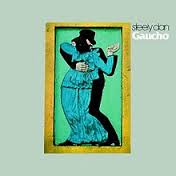By Jon Dolan
Rolling Stone
Last night Donald Fagen and Walter Becker got dressed, walked down the street and made a little lucre playing the most cynical music ever. The event was the final night of Steely Dan’s long stand at New York’s Beacon Theatre. They’ve been here since July playing the final three records of their early career — 1976’s Royal Scam, 1977’s Aja, and Gaucho, an album so stinky with ’70s jaundice it came out in 1980, the most ’70s year of all time.
 Bands usually do these whole-album shows to remind us of their purest moment of Promethean genius. Not so much this time; in the liner notes to the Gaucho reissue Fagen and Becker wrote, “It can truly be said that never before or since in the sorry annals of pop music has so much been expended by so few for so long in the service of so little — or something like that.” Steely Dan fans make Eagles fans look like Sleater-Kinney, but even people who like Gaucho kind of have to admit that it’s pretty slick and callous stuff, an L.A. smooth-rock opus about decadence eating itself at the ocean’s edge. It was so hard to make the band split up for two decades after they finished it — and strangely, or maybe fittingly, it’s also the source of their biggest hit, lech’s lament “Hey Nineteen.”
Bands usually do these whole-album shows to remind us of their purest moment of Promethean genius. Not so much this time; in the liner notes to the Gaucho reissue Fagen and Becker wrote, “It can truly be said that never before or since in the sorry annals of pop music has so much been expended by so few for so long in the service of so little — or something like that.” Steely Dan fans make Eagles fans look like Sleater-Kinney, but even people who like Gaucho kind of have to admit that it’s pretty slick and callous stuff, an L.A. smooth-rock opus about decadence eating itself at the ocean’s edge. It was so hard to make the band split up for two decades after they finished it — and strangely, or maybe fittingly, it’s also the source of their biggest hit, lech’s lament “Hey Nineteen.”
That, of course, is part of its appeal to certain of its partisans. If you ever showed up late to your divorce hearing because you were fighting off a wicked cokeover after a night out with your receptionist, you are a Gaucho Man. One got the sense surveying the Beacon crowd that no small portion of the night’s tickets had been purchased with TARP money.
How would Becker and Fagen take on a record they loving call “(somewhat) problematic”? Happily, the show was a nice mix of sweetness and spite. Sitting at his Fender Rhodes piano, in shades and frumpy burgundy denim shirt, Fagen looked like the piano man at an off-track betting joint. At other points, he wandered the stage like a sour nomad, blowing away on a melodica. Becker stood to his left, stone faced and dressed in black, trading stolidly breezin’ leads with ’70s session hand Larry Carlton, who played on the original record.
I expected that after weeks of shows, they’d have their crack band whipped into is-it-real-or-is-it-Memorex precision, but these legendary studio fascists allowed their hired guns far more personal space than they ever would’ve on record. The shadow boogie opener “Babylon Sisters” was pretty note-for-note, but things opened up from there. The disc went by faster and seemed shorter than it ever did during my many years of trying to make myself kind of like it. Songs breathed a little and sprung to mid-life. The horns were a little more New Orleans; the disco shuffle on “Glamour Profession” was a little looser; songs from the second side of the record that usually blend into the mahogany (the title track and “Third World Man”) wretched a little more feeling from their resigned lilt; “Time Out of Mind” kinda seemed like a lost sunny radio hit. And this particular Steely Dan show offered the strange fun of watching choreographed female R&B back-up singers cooing cryptic stuff like, “Bodacious cowboys / Such as your friend / Will never be welcome here / High in the custerdome.”
Years beyond the drugs and artistic angst that made the Gaucho sessions such an emotional Waterloo, Becker and Fagen could finally find release in music born from a death-throe. Fagen swayed and rolled like an Upper East Side Ray Charles, smiling like a guy having a truly great time.
The band didn’t leave the stage after fulfilling its contractual obligation, instead going straight into an excellent greatest-hits-plus encore. In a bang-for-your-buck bonus, they came two songs short of doing all of Aja, their most popular record (the cutting beat on “I Got the News” was especially cooking). On “Mr. Parker’s Band” big drummer Keith Carlock pushed the tempo to near new-wave speed, and on “Showbiz Kids,” the coolest moment of the night, a tightly coiled groove got sprung into an almost-unrecognizable rhythm beast, with weird angles pointing toward every exit.
Coming up on two hours on the clock, Fagen finally mumbled something about having a great time and led the band into closing versions of “Kid Charlemagne,” and “Reeling In the Years,” songs about people haplessly chasing freedom they can’t get and don’t understand anyway, a classic Dan theme. They wrote those songs as bitter young ’70s dudes, and now as less bitter old ’00s dudes they probably find the prematurely wizened irony of their Promethean youth pretty funny, and less problematic too. Best non-musical thing about the show: Fagen sipping a can of Coke between songs, keeping up his pep as he made tonight a wonderful thing.

No comments yet.